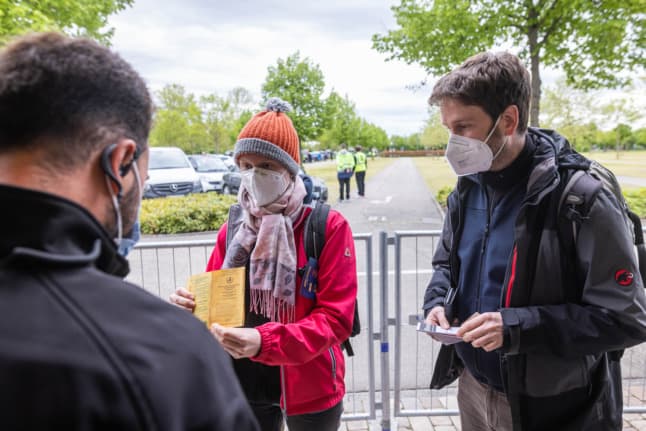Germany plans 'full freedom' for vaccinated in Covid crunch talks

People who are vaccinated against - or recovered from - Covid could regain a number of freedoms in Germany this autumn, while the unvaccinated are likely to face charges for regular tests.
The proposals, which were laid out in a paper obtained by German daily Tagesspiegel, have been put forward by the Chancellery ahead of key talks between Angela Merkel and the 16 state leaders.
According to Tagesspiegel, Merkel's office is pushing for those who have been fully jabbed to be given an almost complete return to normality in September - with the except of small rules like wearing a mask in public transport and shops.
In reality, that means that vaccinated and recovered people "will be exempt from federal and state regulations that impose testing requirements", the paper states.
They would also be able to continue to avoid quarantine when returning from abroad - even after visiting virus variant or high-incidence areas.
READ ALSO: How Germany’s new travel rules to fight the fourth Covid wave may affect your holiday plans
The requirement to show a negative test is likely to be introduced for practically all events and public venues before the end of August, meaning unvaccinated people will have to get tested regularly in order to eat in restaurants or attend sports events like football matches, for example.
In addition, Merkel and the state leaders are set to discuss whether to end the current free rapid testing scheme, meaning unvaccinated people would regularly need to shell out between €20-30 if they wanted to visit a museum, or go to gym or bar, for instance.
READ ALSO:
- When (and why) Germany plans to scrap free Covid tests for all
- Germany divided over whether to charge people for Covid rapid tests
Those who have a certificate of vaccination or recovery to hand, however, would simply have to show their digital certificate of vaccination or recovery, or a paper copy of either.
A new 'health pass' system?
As reported by The Local on Friday, the move equates to a 'health pass' system of the sort introduced in countries like Italy and France, where people need to show evidence of vaccination, recovery or negative tests in order to participate in public life again.
Describing where tests or certificates might be needed, the paper reportedly mentions indoor catering (i.e. restaurants and bars), accommodation such as hotels, gyms and services that require close physical contact, like hairdressers and beauty sales.
In addition, people could soon need to show their 'health pass' to access hospitals, old people's and nursing homes, or attend big sports or cultural events.
READ ALSO: Is Germany set to introduce a nationwide ‘health pass’ system?
While some states have a similar system in place for certain types of event or activity, the regulations are currently not uniform across the country. If Merkel's proposals are taken up, the system could well come in nationwide.
Lolli tests, '3G' and the state of emergency
A number of other Covid-related topics are up for discussion at Tuesday's roundtable.
Some of the other items believed to be on the agenda include:
- Lolli tests for schoolchildren
Lolli tests - a more comfortable alternative to the current nasal swap - are purportedly set to be used in schools and nurseries as a precaution against Covid breakouts.

Schoolchildren take their Lolli tests at a school in Essen. The Lolli tests are reported to be on the agenda at Tuesday's talks. Photo: picture alliance/dpa | Roland Weihrauch
According to Tagesspiegel, the Chancellery paper suggests that exceptions would be in place for very young children.
- Transitioning from '3G' to '2G'
Currently, the '3G' rule (geimpft, genesen, gestestet) allows vaccinated, recovered or recently tested people to cross the border into Germany and enjoy activities like shopping or going to a concert.
In light the faltering inoculation drive, however, state premiers will debate federal government proposals to introduce a '2G' system instead, which would remove the option to provide a negative test rather than proof of vaccination or recovery.
This is allegedly an option being pushed by the Federal Health Ministry - but only if infections reach a critical level in the coming months.
- A nationwide 'traffic light' system
Though the Robert Koch Institute (RKI) is keen for the 7-day incidence of infections per 100,000 people to remain a crucial bellwether for decisions on Covid regulations, there is general agreement among politicians that other factors need to be taken into account.
This is because, with around 55 percent of the population fully vaccinated, hospital admissions could remain at a low level in spite of rising infection rates.
READ ALSO: German virologist says UK’s falling Covid cases despite lifting restrictions gives ‘hope’
Deciding the basis on which key political decisions should be made will be a major discussion point at the upcoming talks. If politicians decide that the 7-day incidence is no longer enough by itself, plans could be put in place for a nationwide 'traffic light' system - similar to the one in Mecklenburg Western-Pomerania - that grades the Covid situation based on numerous factors, such as infections, deaths and hospitalisations.
- Extending the 'epidemic situation' legislation
A piece of legislation declaring the country to be in an "epidemic situation of national significance" was last voted on in early June, and is due to expire on September 11th. The legislation provides a legal basis for the federal government to put emergency regulations in place during the pandemic and even overrule the states on some matters.
At the talks this Tuesday, the government and state leaders will discuss renewing this legislation for another three months.
READ ALSO: What can we expect from Merkel’s Covid talks with state leaders?
Comments
See Also
The proposals, which were laid out in a paper obtained by German daily Tagesspiegel, have been put forward by the Chancellery ahead of key talks between Angela Merkel and the 16 state leaders.
According to Tagesspiegel, Merkel's office is pushing for those who have been fully jabbed to be given an almost complete return to normality in September - with the except of small rules like wearing a mask in public transport and shops.
In reality, that means that vaccinated and recovered people "will be exempt from federal and state regulations that impose testing requirements", the paper states.
They would also be able to continue to avoid quarantine when returning from abroad - even after visiting virus variant or high-incidence areas.
READ ALSO: How Germany’s new travel rules to fight the fourth Covid wave may affect your holiday plans
The requirement to show a negative test is likely to be introduced for practically all events and public venues before the end of August, meaning unvaccinated people will have to get tested regularly in order to eat in restaurants or attend sports events like football matches, for example.
In addition, Merkel and the state leaders are set to discuss whether to end the current free rapid testing scheme, meaning unvaccinated people would regularly need to shell out between €20-30 if they wanted to visit a museum, or go to gym or bar, for instance.
READ ALSO:
- When (and why) Germany plans to scrap free Covid tests for all
- Germany divided over whether to charge people for Covid rapid tests
Those who have a certificate of vaccination or recovery to hand, however, would simply have to show their digital certificate of vaccination or recovery, or a paper copy of either.
A new 'health pass' system?
As reported by The Local on Friday, the move equates to a 'health pass' system of the sort introduced in countries like Italy and France, where people need to show evidence of vaccination, recovery or negative tests in order to participate in public life again.
Describing where tests or certificates might be needed, the paper reportedly mentions indoor catering (i.e. restaurants and bars), accommodation such as hotels, gyms and services that require close physical contact, like hairdressers and beauty sales.
In addition, people could soon need to show their 'health pass' to access hospitals, old people's and nursing homes, or attend big sports or cultural events.
READ ALSO: Is Germany set to introduce a nationwide ‘health pass’ system?
While some states have a similar system in place for certain types of event or activity, the regulations are currently not uniform across the country. If Merkel's proposals are taken up, the system could well come in nationwide.
Lolli tests, '3G' and the state of emergency
A number of other Covid-related topics are up for discussion at Tuesday's roundtable.
Some of the other items believed to be on the agenda include:
- Lolli tests for schoolchildren
Lolli tests - a more comfortable alternative to the current nasal swap - are purportedly set to be used in schools and nurseries as a precaution against Covid breakouts.

Schoolchildren take their Lolli tests at a school in Essen. The Lolli tests are reported to be on the agenda at Tuesday's talks. Photo: picture alliance/dpa | Roland Weihrauch
According to Tagesspiegel, the Chancellery paper suggests that exceptions would be in place for very young children.
- Transitioning from '3G' to '2G'
Currently, the '3G' rule (geimpft, genesen, gestestet) allows vaccinated, recovered or recently tested people to cross the border into Germany and enjoy activities like shopping or going to a concert.
In light the faltering inoculation drive, however, state premiers will debate federal government proposals to introduce a '2G' system instead, which would remove the option to provide a negative test rather than proof of vaccination or recovery.
This is allegedly an option being pushed by the Federal Health Ministry - but only if infections reach a critical level in the coming months.
- A nationwide 'traffic light' system
Though the Robert Koch Institute (RKI) is keen for the 7-day incidence of infections per 100,000 people to remain a crucial bellwether for decisions on Covid regulations, there is general agreement among politicians that other factors need to be taken into account.
This is because, with around 55 percent of the population fully vaccinated, hospital admissions could remain at a low level in spite of rising infection rates.
READ ALSO: German virologist says UK’s falling Covid cases despite lifting restrictions gives ‘hope’
Deciding the basis on which key political decisions should be made will be a major discussion point at the upcoming talks. If politicians decide that the 7-day incidence is no longer enough by itself, plans could be put in place for a nationwide 'traffic light' system - similar to the one in Mecklenburg Western-Pomerania - that grades the Covid situation based on numerous factors, such as infections, deaths and hospitalisations.
- Extending the 'epidemic situation' legislation
A piece of legislation declaring the country to be in an "epidemic situation of national significance" was last voted on in early June, and is due to expire on September 11th. The legislation provides a legal basis for the federal government to put emergency regulations in place during the pandemic and even overrule the states on some matters.
At the talks this Tuesday, the government and state leaders will discuss renewing this legislation for another three months.
READ ALSO: What can we expect from Merkel’s Covid talks with state leaders?
Join the conversation in our comments section below. Share your own views and experience and if you have a question or suggestion for our journalists then email us at [email protected].
Please keep comments civil, constructive and on topic – and make sure to read our terms of use before getting involved.
Please log in here to leave a comment.